[Dec 2007, Volume 4 Quarterly Issue] Pdf File size - The IIPM Think ...
[Dec 2007, Volume 4 Quarterly Issue] Pdf File size - The IIPM Think ...
[Dec 2007, Volume 4 Quarterly Issue] Pdf File size - The IIPM Think ...
You also want an ePaper? Increase the reach of your titles
YUMPU automatically turns print PDFs into web optimized ePapers that Google loves.
MORE MARKETS, LESS GOVERNMENT<br />
within the institution to support under<br />
resourced but important subjects.<br />
Without cross-subsidization, a university<br />
cannot successfully compete.<br />
Hence they would argue that international<br />
trade and the success of mastering<br />
the modern art of university administration<br />
is the key ingredient<br />
preventing ‘academic capitalism’.<br />
Trade Related Aspects Of<br />
Intellectual Property Rights<br />
(TRIPS) Excludes Low-Income<br />
scholars from successfully<br />
marketing their own curricula<br />
Critics worry that international trade<br />
in education would lower access to local<br />
curricula; international property<br />
rights agreements would protect the<br />
privileged and freeze-out those who<br />
have not yet broken into the market.<br />
<strong>The</strong>y imagine that there will be an avalanche<br />
of foreign books, guidelines,<br />
and syllabi entering India, making it<br />
difficult for local students to be educated<br />
with local materials. Those who<br />
favor open trade say that adhering to<br />
agreements on intellectual property<br />
would increase access to high quality<br />
pedagogical materials because it would<br />
insure income from their sale. In turn<br />
this would increase the incentive to<br />
write new curricula, and would lead to<br />
greater supply, wider choice, and lower<br />
real prices. In their vision, Indian producers<br />
of curricula would compete successfully,<br />
placing the Indian student<br />
consumer at a distinct advantage over<br />
a circumstance in which there would<br />
be no competition.<br />
Privatization Of Education<br />
Finance Will <strong>Dec</strong>rease Access<br />
To A Public Good<br />
Critics argue that international trade<br />
in education will lead to privatization,<br />
meaning that it will lead to an increase<br />
in the proportion of higher education<br />
finance from sources other than government.<br />
<strong>The</strong>y say that the higher the<br />
privatization the lower the access to a<br />
public good. <strong>The</strong>y say that privatization<br />
helps exclude the poor since they<br />
are the ones who least can afford it.<br />
Those who argue in favor of trade<br />
point out that no public good is ‘free’.<br />
<strong>The</strong>y believe that reforms in education<br />
finance will increase the revenue<br />
for both public and private educational<br />
providers; hence, it will increase<br />
the supply and will increase access to<br />
a public good. Recent international<br />
research on stratification and higher<br />
education suggests that higher education<br />
expansion reduces inequality;<br />
greater privatization is associated<br />
with higher levels of expansion and<br />
higher levels of social equity. <strong>The</strong> opposite<br />
is also true: control of expansion<br />
is associated with<br />
a monopoly of state financing,<br />
and hence with greater inequality<br />
of access.<br />
Trade Threatens <strong>The</strong> ‘social<br />
Contract’ Between Generations<br />
If trade leads to greater privatization<br />
(higher portions of the university<br />
budget from sources other than government),<br />
students will have to pay<br />
tuition. To do that they will have to rely<br />
on the generosity of their families,<br />
<strong>The</strong> problem is that the arguments for and against<br />
opening India to higher education trade are generally made<br />
by two divergent groups of stakeholders. Macro-economists<br />
generally favor international competition;<br />
education policy offi cials generally do not<br />
hence the present generation is expected<br />
to finance the education of future<br />
generations; and the social contract is<br />
broken. Proponents of more open trade<br />
counter with a question and a statement.<br />
<strong>The</strong> question is: when did it become<br />
true that the present generation<br />
should not sacrifice to help pay for a<br />
future generation? Isn’t that how generations<br />
have been organized since the<br />
beginning? Also, for those who cannot<br />
afford the tuition there would be scholarship<br />
aid. <strong>The</strong>refore with tuition there<br />
would be more equity, and more equity<br />
would help to strengthen the social<br />
contract between generations.<br />
Trade Jeopardizes Human<br />
Rights Because It Contradicts<br />
National Commitments For<br />
Free Education<br />
Critics point to the <strong>Dec</strong>laration of Human<br />
Rights and other legal contracts<br />
associated with the United Nations to<br />
suggest that if higher education is not<br />
THE INDIA ECONOMY REVIEW<br />
91


![[Dec 2007, Volume 4 Quarterly Issue] Pdf File size - The IIPM Think ...](https://img.yumpu.com/29766298/90/500x640/dec-2007-volume-4-quarterly-issue-pdf-file-size-the-iipm-think-.jpg)
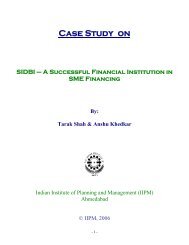
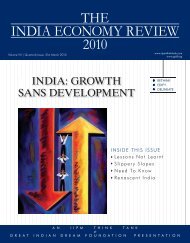
![[Feb 2008, Volume V Annual Issue] Pdf File size - The IIPM Think Tank](https://img.yumpu.com/43961117/1/190x245/feb-2008-volume-v-annual-issue-pdf-file-size-the-iipm-think-tank.jpg?quality=85)
![[June 2008, Volume V Quarterly Issue] Pdf File size - The IIPM Think ...](https://img.yumpu.com/41693247/1/190x245/june-2008-volume-v-quarterly-issue-pdf-file-size-the-iipm-think-.jpg?quality=85)
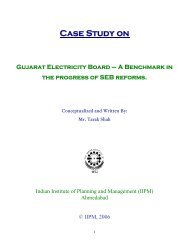
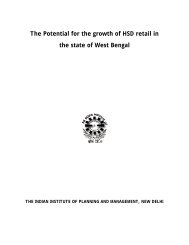
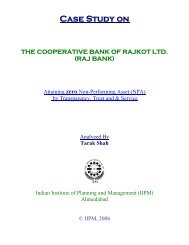
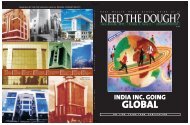
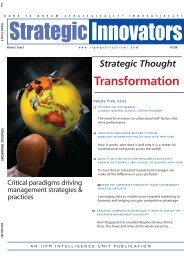
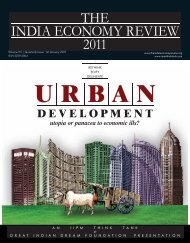
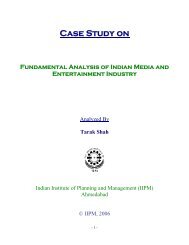
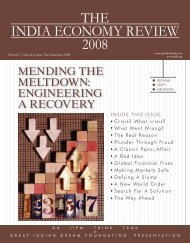
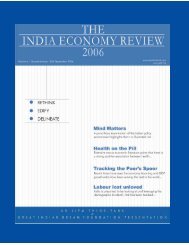
![[Volume VI | Quarterly Issue: 31st May 2009] Pdf File size](https://img.yumpu.com/27796051/1/190x245/volume-vi-quarterly-issue-31st-may-2009-pdf-file-size.jpg?quality=85)